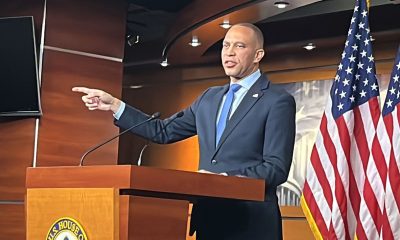Politics
GOP Focus for Congress; Cut Deficit, Don’t Stumble

House Speaker John Boehner of Ohio strides to the House chamber on Capitol Hill in Washington. (AP Photo/J. Scott Applewhite)
Alan Fram, ASSOCIATED PRESS
WASHINGTON (AP) — In the first Republican-dominated Congress to confront President Barack Obama, GOP leaders will focus on bolstering the economy and cutting the budget — and oh yes, avoiding self-inflicted calamities that make voters wonder if the party can govern competently.
When the new Congress raises the curtain Tuesday, Republicans will run both the House and Senate for the first time in eight years. GOP leaders want to showcase their legislative priorities, mixing accomplishments with showdowns with Obama but shunning government shutdowns and other chaotic standoffs.
Another priority is minimizing distractions like the recent admission by No. 3 House leader Steve Scalise, R-La., that he addressed a white supremacist group in 2002.
“Serious adults are in charge here and we intend to make progress,” incoming Senate Majority Leader Mitch McConnell, R-Ky., told The Associated Press recently.
McConnell says the Senate’s first bill would force construction of the Keystone XL oil pipeline, which Republicans call a job creator but Obama and many Democrats say threatens the environment.
The House leads off with legislation letting small companies sidestep some requirements of Obama’s prized health care overhaul by hiring veterans, followed by other measures weakening that law and pushing the Keystone pipeline.
Other bills likely early would block Obama’s executive actions on immigration and ease environmental and business regulations that the GOP contends stifles job growth. Additional bills would cut spending, squeeze Medicare and other benefit programs, revamp tax laws, finance highway construction and speed congressional approval of trade treaties.
“We’re focused on job creation,” said House Majority Leader Kevin McCarthy, R-Calif., and running “a more efficient, effective, accountable government.”
Democrats say the GOP’s goal is cutting taxes on the rich while crippling Obama’s accomplishments, including expanded health coverage and restrictions on financial institutions.
“In the minority, your role is to play defense and stop the worst from happening,” said Sen. Dick Durbin of Illinois, the No. 2 Senate Democrat.
Republicans captured Senate control in November’s midterm elections, adding nine seats for a 54-46 advantage that includes two Democratic-leaning independents. A 13-seat gain swelled their House majority to a commanding 246-188 with one vacancy, the result of New York Republican Michael Grimm’s planned resignation following his guilty plea on a tax evasion charge.
With McConnell and House Speaker John Boehner, R-Ohio, jointly mapping an agenda and scheduling long congressional work periods, goals and potential pitfalls include:
___
DISTRACTIONS AND THE CALENDAR
GOP leaders still face tea party lawmakers. Their recalcitrance helped produce stalemates with Obama that excited conservative Republican voters but appalled others, causing GOP approval to plummet. Top Republicans want to ensure that Scalise’s 2002 speech, for which he has apologized, doesn’t hurt their efforts to appeal to more diverse voters.
Another complication: By autumn 2015, the developing presidential race could distract voters from congressional Republicans’ messaging.
“We want things arriving at the president’s desk, and a lot of those things happening sooner rather than later,” said Rep. Tom Cole, R-Okla. “It’s not helpful to us if we drag into spring or summer and the stories are, ‘It’s a do-nothing Congress’ or a confrontation.”
___
ENOUGH REPUBLICANS?
McConnell will often need at least six Democrats for the 60 Senate votes required to overcome filibusters, procedural delays aimed at scuttling bills. Republicans will need two-thirds majorities in each chamber, impossible without Democratic support, to override Obama vetoes that await bills threatening his health care law and his actions easing immigration rules.
McConnell says at an upcoming House-Senate Republican retreat, he will warn, “Don’t get your expectations so high that you’re inevitably going to be disappointed.”
___
IMMIGRATION
Funding for the Department of Homeland Security, which enforces immigration laws, runs through late February.
House Republicans plan to quickly vote to finance that agency through September but are still discussing how to use that bill to block Obama’s executive actions deferring deportation for millions of immigrants in the United States illegally. That measure’s Senate fate and GOP strategy for an Obama veto remain unclear.
Republicans rule out a sweeping immigration overhaul like the Senate-passed, bipartisan 2013 measure. They plan narrower bills that could attract Democrats, bolstering border security and easing immigration restrictions on highly skilled and farm workers.
___
HEALTH CARE
Republicans are itching to vote to repeal Obama’s 2010 health care law, knowing that would never get his signature.
They’re preparing measures repealing the medical device tax and ending the requirement that people buy medical coverage. They would also exempt companies from providing coverage to employees who work under 40 hours weekly, up from the current 30 hours.
___
BUDGET AND TAXES
The new House Budget Committee chairman, Rep. Tom Price, R-Ga., expects his chamber to approve a budget similar to blueprints written by former chairman Paul Ryan, R-Wis., ending deficits in a decade, trimming spending and overhauling benefits like Medicare. Senate Republicans want belt-tightening, but McConnell didn’t promise a balanced budget in 10 years.
Republicans want to rewrite tax laws but progress is uncertain. They want to lower rates for corporations and for businesses whose owners pay individual taxes, with lost revenue recovered by eliminating unspecified tax breaks. Democrats want the exercise to raise fresh revenue, partly to boost dwindling highway funds.
___
ALSO PLANNED
Price wants to use legislation preventing a federal default, around summer, to pressure Obama to cut spending, calling such bills “pinch points to get good policy.” McConnell said with GOP congressional control, a default showdown is unneeded because of other opportunities, such as must-pass spending bills, that the GOP can use to constrain agencies.
Republicans want to send Obama measures that the GOP-led House passed the past two years but died in the Democratic-run Senate. These include bills blocking Environmental Protection Agency curbs on pollution and easing business regulations. The GOP calls these measures job creators; Democrats call them favors for special interests.
Republicans also want to consider legislation blocking Obama’s normalized relations with Cuba, penalizing Iran and authorizing force against Islamic State militants.
Copyright 2015 The Associated Press. All rights reserved. This material may not be published, broadcast, rewritten or redistributed.
###
Activism
Oakland Post: Week of November 26 – December 2, 2025
The printed Weekly Edition of the Oakland Post: Week of November 26 – December 2, 2025

To enlarge your view of this issue, use the slider, magnifying glass icon or full page icon in the lower right corner of the browser window.
Activism
Oakland Post: Week of November 19 – 25, 2025
The printed Weekly Edition of the Oakland Post: Week of November 19 – 25, 2025

To enlarge your view of this issue, use the slider, magnifying glass icon or full page icon in the lower right corner of the browser window.
Activism
Oakland Post: Week of November 12 – 18, 2025
The printed Weekly Edition of the Oakland Post: Week of November 12 – 18, 2025

To enlarge your view of this issue, use the slider, magnifying glass icon or full page icon in the lower right corner of the browser window.
-

 Activism4 weeks ago
Activism4 weeks agoOakland Post: Week of November 12 – 18, 2025
-

 Activism3 weeks ago
Activism3 weeks agoIN MEMORIAM: William ‘Bill’ Patterson, 94
-

 Activism3 weeks ago
Activism3 weeks agoHow Charles R. Drew University Navigated More Than $20 Million in Fed Cuts – Still Prioritizing Students and Community Health
-

 Bay Area4 weeks ago
Bay Area4 weeks agoNo Justice in the Justice System
-

 #NNPA BlackPress3 weeks ago
#NNPA BlackPress3 weeks agoLewis Hamilton set to start LAST in Saturday Night’s Las Vegas Grand Prix
-

 #NNPA BlackPress2 weeks ago
#NNPA BlackPress2 weeks agoBeyoncé and Jay-Z make rare public appearance with Lewis Hamilton at Las Vegas Grand Prix
-

 Activism2 weeks ago
Activism2 weeks agoOakland Post: Week of November 19 – 25, 2025
-

 #NNPA BlackPress4 weeks ago
#NNPA BlackPress4 weeks agoThe Perfumed Hand of Hypocrisy: Trump Hosted Former Terror Suspect While America Condemns a Muslim Mayor
























































